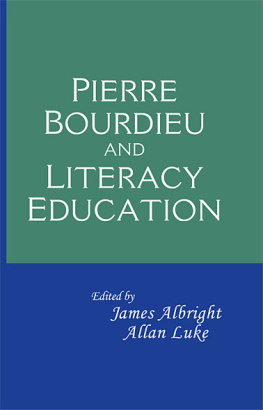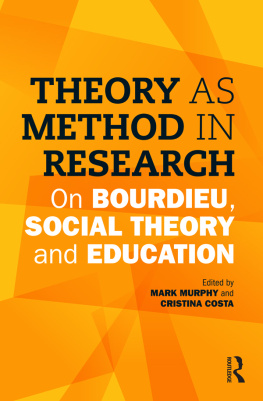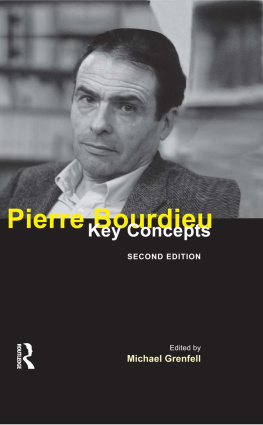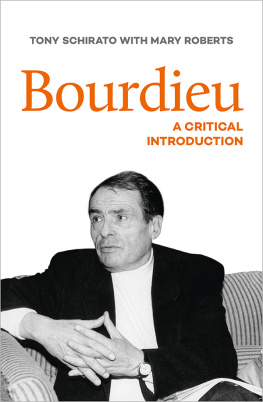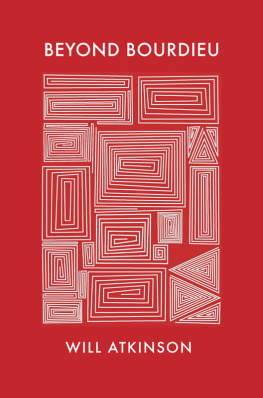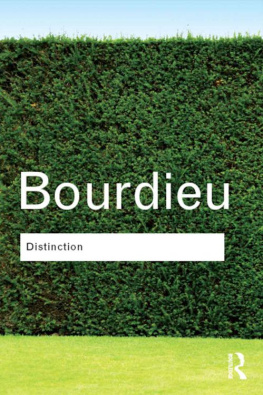CONVERSATIONS WITH BOURDIEU
THE JOHANNESBURG MOMENT
MICHEL BURAWOY AND KARL VON HOLDT
CONVERSATIONS WITH BOURDIEU
THE JOHANNESBURG MOMENT
MICHEL BURAWOY AND KARL VON HOLDT

Published in South Africa by:
Wits University Press
1 Jan Smuts Avenue
Johannesburg
www.witspress.co.za
Copyright Michael Burawoy and Karl von Holdt 2012
First published 2012
ISBN 978-1-86814-540-9
All rights reserved. No part of this publication may be reproduced, stored in a retrieval system, or transmitted in any form or by any means, electronic, mechanical, photocopying, recording or otherwise, without the written permission of the publisher, except in accordance with the provisions of the Copyright Act, Act 98 of 1978.
Edited by Alex Potter
Cover design and layout by Hothouse South Africa
Printed and bound by Paarl Media
CONTENTS
MICHAEL BURAWOY
KARL VON HOLDT
MICHAEL BURAWOY
KARL VON HOLDT
MICHAEL BURAWOY
KARL VON HOLDT
MICHAEL BURAWOY
KARL VON HOLDT
MICHAEL BURAWOY
KARL VON HOLDT
MICHAEL BURAWOY
KARL VON HOLDT
MICHAEL BURAWOY
KARL VON HOLDT
MICHAEL BURAWOY
KARL VON HOLDT
MICHAEL BURAWOY
KARL VON HOLDT
MICHAEL BURAWOY
ABBREVIATIONS AND ACRONYMS
| ANC | African National Congress |
| COSATU | Congress of South African Trade Unions |
| CPF | Community Policing Forum |
| CWP | Community Work Programme |
| DA | Democratic Alliance |
| FLN | Front de Libration Nationale/ National Liberation Front |
| FOSATU | Federation of South African Trade Unions |
| MEC | Member of the Executive Council |
| SACP | South African Communist Party |
| SWOP | Society, Work and Development Institute |
| UDF | United Democratic Front |
PREFACE
MICHAEL BURAWOY
My four-year stint with the Ford PhDs, which had brought me to the University of the Witwatersrand for three weeks every year, had come to an end. Karl von Holdt, then acting director of SWOP (the Society, Work and Development Institute) invited me to come to Wits for a semester on a Mellon Visiting Professorship. I would work with students and faculty and also give public lectures. There was interest in my giving lectures on the work of Pierre Bourdieu, which I had previously done at the University of Wisconsin. I revised and expanded these lectures from six to eight. As at Wisconsin, the idea was to bring together faculty and students from different departments and develop another side to SWOPs activities.
But Wits would be a different experience altogether, as Bourdieu was not the popular theorist in South Africa that he was in Wisconsin. After all, Bourdieu was not only a theorist of the North and from the North, but more specifically of France and from France, which made him more unfamiliar than Anglo-American theorists. His convoluted style of writing, his elliptical sentences, his erudition and his philosophical grounding in sum, his deployment of cultural capital make his work challenging to access.
As I had done in Wisconsin, I sought to interpret Bourdieu by presenting his ideas in relation to Marxism through a series of imaginary conversations between Bourdieu and Marx, Gramsci, Fanon, Freire, Beauvoir, Mills and myself, respectively. Bourdieu makes reference to Marx indeed, his work is a deep engagement with Marx (as well as Durkheim and Weber) but Marx never receives a sustained examination. As for Gramsci, Fanon and Beauvoir, his scattered references and footnotes are contemptuous, while Freire and Mills hardly get a mention. Nonetheless, there are some interesting parallels and convergences with these theorists that more often than not evaporate under closer examination. My endeavour was to rescue these figures buried in Bourdieu with a view to problematising both Bourdieu and Marxism. The Marxists I chose and I realise Mills had an ambiguous relationship with Marxism were all concerned with developing a theory of superstructures or ideological domination, and therefore most convergent with what lies at the centre of Bourdieus opus: the theory of symbolic domination. These theorists also had important things to say about intellectuals and the public face of social science, and here too there was much to debate, as Bourdieu was and still is the pre-eminent public sociologist of our era. Like Marxist theory, Bourdieu was always concerned with the relation of theory and practice.
Still, this was South Africa, and even if Marxism had more currency here than in other parts of the world, it was nonetheless flagging; and, moreover, Bourdieus concerns with symbolic domination seemed removed from the South African situation, where physical violence seemed far more salient something about which Bourdieu has little to say beyond some of his early writings on Algeria. My original intention was to try and show the significance of Bourdieu to the New South Africa; this was, after all, a time of the struggles between African National Congress Youth leader Julius Malema and Congress of South African Trade Unions president Zwelinzima Vavi, struggles that might be seen as precisely open warfare of a symbolic kind, with Vavi even calling for a lifestyle audit for Malema effectively questioning the basis of ruling-class distinction, a questioning that would be difficult to imagine in France, with its settled symbolic order. It was also the time of preparation for the FIFA Soccer World Cup, a spectacle if ever there were one that absorbed the attention of the entire population, masking the real interests at play. Again, the symbolic world of post-apartheid South Africa could not be disregarded. Still, it could be argued that Bourdieus significance might be the non-applicability of his ideas to South Africa, i.e. that his ideas are irrevocably Northern or French.
The eight conversations held over a period of six weeks in February and March 2010 brought in crowds from different quarters of the university, and each presentation was followed by heated exchanges. They were made all the more interesting by Karl von Holdt, who consistently defended Bourdieu against Marxist detractors, showing how his ideas do have validity in South Africa. My own attempt to incorporate South Africa into these conversations proved to be paltry and wooden, and so when it came to writing up the lectures, I invited Karl to respond with his own reflections. He has done this in an exceptional manner, in a sense returning Bourdieu to where he began his sociological life Africa. After all, many of Bourdieus abiding ideas are taken from his interpretation of the Kabyle kinship society in Algeria. It was from his studies of the Kabyle that he developed the notions of symbolic capital, misrecognition, habitus, male domination and so forth. Bourdieu applied these ideas to French society, and Karl has now taken them back to Africa, pointing to the symbolic dimensions of township violence, the power of the concept of habitus, the disciplinary mode of education and the place of intellectuals in contemporary South Africa.
If I presented a rather arid conversation between Bourdieu and Marxism, Karl has extended the conversational mode to one between Northern and Southern theory, but based on more than three decades of engaged research and contestation in education, labour and community. Karl brings to the forefront a subordinate register in Bourdieus writings, the dimensions of struggle, crisis and social transformation. He does not, however, engage Bourdieus writings as a combat sport and he does not dismiss or ignore either myself or Bourdieu, but uses Bourdieu to construct a dialogue about the South Africa of yesterday, today and tomorrow. So we now offer a set of conversations on conversations in the hope of sparking further debate and discussion about the trajectory of South Africa, about the continuing vitality of Marxism and about the relevance of Bourdieus thought to different contexts.
Next page

